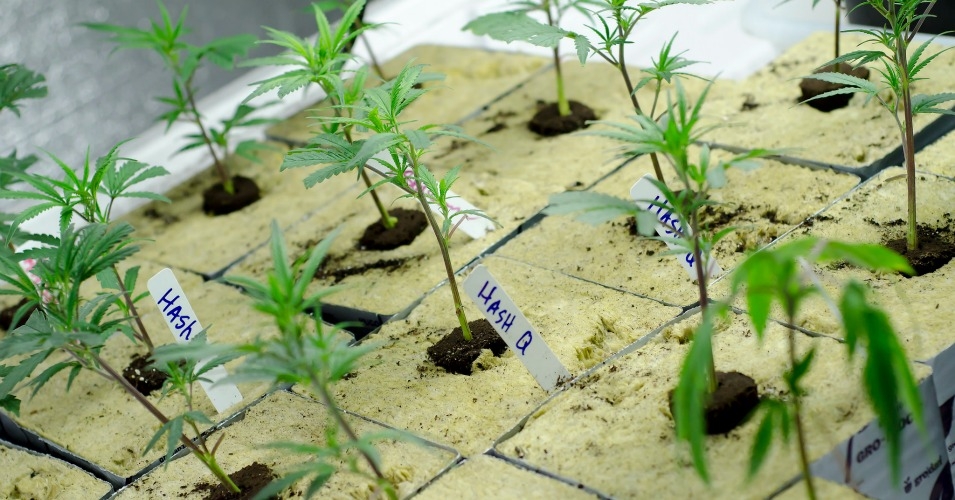With its widespread usage and support, research into the drug has never been so critical
Written by Lauren McCauley, staff writer for Common Dreams. Published 10-21-15.

A marijuana grow in Colorado, which voted to legalize the drug in 2012. (Photo: Brett Levin/cc/flickr)
Government bias and schizophrenic marijuana policy in the U.S. are stifling research into its medical uses, charges a new paper published Tuesday by researchers with the Brookings Institution, which in turn could heighten public policy and health risks as more and more states legalize medical and recreational marijuana usage.
While information about the possible benefits and harms of the drug has never been so critical, “the U.S. government has held back the medical community’s ability to conduct the type of research that the scientific community considers the experimental gold standard in guiding medical practice,” argue (pdf) Brookings fellow John Hudak and senior research assistant Grace Wallack, both with the Washington D.C. think tank’s Center for Effective Public Management.
“Of all the controlled substances that the federal government regulates, cannabis is treated in a unique manner in ways that specifically impede research,” continue Hudak and Wallack. “Statutory, regulatory, bureaucratic, and cultural barriers have paralyzed science and threatened the integrity of research freedom in this area.”
The report credits President Obama with introducing some reforms but it argues that marijuana policy as it stands “is inconsistent and often contradictory,” and thus deters important scientific study.
The report looks at various proposals to overcoming the stigma of marijuana research and argues that moving the drug from a Schedule I to Schedule II classification—a move long-sought by drug reform advocates—would be a notable starting point as rescheduling would designate cannabis as possibly having “accepted medical use.”
Such a move “would signal to the medical community that FDA and NIH are ready to take medical marijuana research seriously, and help overcome a government-sponsored chilling effect on research that manifests in direct and indirect ways,” Hudak and Wallack write.
Other roadblocks cited include the current Drug Enforcement Agency (DEA)-mandate that marijuana for research comes only from the National Institute on Drug Abuse (NIDA), which contracts exclusively with the University of Mississippi.
Also, the paper calls on relevant government agencies—including the DEA, Centers for Medicare and Medicaid Services (CMS), the IRS, and the National Institute of Health (NIH)—to clarify the many “legal gray areas” surrounding cannabis.
Public support for marijuana use is at its highest level, according to a Gallup survey released Wednesday, with 58 percent of the population backing full legalization.
What’s more, a study of National Institute on Alcohol Abuse and Alcoholism statistics also released Wednesday found that its use among adults has doubled in the years between 2001 and 2013, amounting to as many as 22 million mostly recreational users today.
With recreational marijuana now legal in four states and medical marijuana programs in 23, the public has made it clear that it is interested in exploring the drug as an alternative remedy for a host of ailments including pain, nausea, loss of appetite, sleeplessness, and neurological problems, among others.
Government bias, Hudak and Wallack argue, should not stand in the way. “The proper role of government, we would argue, would be to fund science without imposing answers to scientific questions,” they write.
Greater research is an issue that people on both side of the marijuana debate should support, the paper concludes.
“If you believe that cannabis is an elixir that can be used to treat a variety of ailments with very few side effects or risks of overdose, then you should support the scientific community validating your perspective,” it states. “Alternatively, if you believe cannabis is a gateway drug, inappropriate for pharmaceutical (or any) use because it is a source of addiction and has no medicinal value, then you should also support a scientific validation of your views. Finally, if you believe cannabis’ medicinal value is an open, unanswered, empirical question, then you should embrace the medical community’s ability to provide definitive evidence.”
This work is licensed under a Creative Commons Attribution-Share Alike 3.0 License.
Related Articles:
In Victory for Medical Marijuana, Court Tells DOJ to Lay Off Legal Providers
Is UN Planning to Call for Global Decriminalization of All Drugs?
Between Pot and a Hard Place: Fed Rejects Colorado Marijuana Bank






